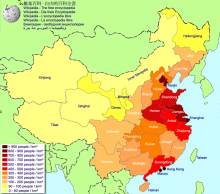The Communist Party of China in 2013 announced a plan to enact major taxation reforms aimed at narrowing the divide between the nation’s urban elite and rural poor. This policy should be of particular interest internationally given that economic inequality has become such a hot topic since the financial recession of 2008. In recent years, China has been held up as an example of the inevitability of uneven development. It has been suggested that even in a supposedly Communist state, the cause of development and the realities of the market will ensure that some win big while others are left behind. But as Occupy protesters, activists, and a growing number of economists encourage a rethink of the global economic system, it is worth evaluating the motivations of the CPP in seriously attempting to narrow the divide between the rich and poor.
Recent economic analysis has demonstrated the extent to which the wealth of the United States, bastion of the free market, has fallen into the hands of a tiny minority of citizens. By 2011, 1% of Americans came to control 40% of the nation’s wealth. In 2009, America’s Gini coefficient, a measure of economic inequality on a scale increasing between 0 and 1, reached 0.468 nationally and was as high as 0.65 in some states. This is well above the level of 0.40 considered a trigger for social discontent. It is these figures and the suggestion of a rigged system they pose that inspired the Occupy Wall Street movement and countless acts of protest and resistance by American citizens disillusioned with an economic system from which they felt excluded. And yet, even under Democratic president Barack Obama, it is an understatement to say that an uphill battle lies ahead in enacting progressive taxation schemes or reforms of the American banking system.
But with a Gini coefficient slightly exceeding that of the United States, at 0.474, and increasing civil unrest, the Communist Party of China, even without the pressure of democratic institutions, has chosen to act. As The Guardian reported, the new taxation regime aims to reduce the divide between the urban elite and rural poor, targeting wealthy state-owned firms and assisting rural migrants. This strict policy reform from an authoritarian government demonstrates the fact that narrowing the divide between the rich and poor is not simply a nicety that citizens may request through democratic institutions, but a necessary policy to ensure social stability.
Over the coming years, comparing the experiences of American and Chinese regimes in narrowing economic inequality within their countries will provide an interesting insight into the motivations and capabilities of their systems of government. Some would argue that in a system devoid of institutional uncertainty, the stakes are higher for the Communist Party than for a democratic government.
Isabel Duchesne is a third year student at Trinity College, majoring in Political Science and Anthropology.
